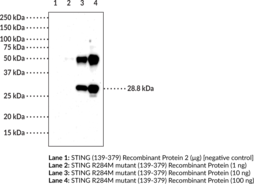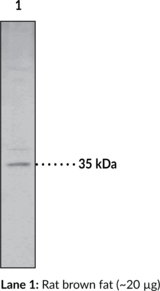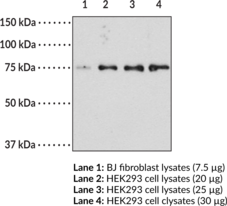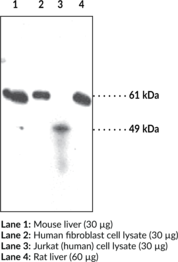Description
Stimulator of interferon genes (STING) is a component of the innate immune response that binds to cyclic dinucleotides, which are bacterial second messengers, leading to activation of NF-κB and transcription of immunomodulatory genes, including type I interferon (IFN).{22400,22401,24611,24607} The R284M mutation in STING is associated with constitutive activation of downstream signaling. It increases the propensity of STING to dimerize and associate with the kinase TBK1 (Item No. 22817), enhancing the ability of STING to activate IRF3 (Item No. 22811) and NF-κB (Item No. 10009818) and induce a type I IFN response.{41454} However, the R284M mutation occurs outside of the dimerization region between positions 153-177, so rather than a direct effect on dimerization, it is predicted to promote or inhibit binding of a cellular factor that stabilizes or impairs STING dimerization. Cayman’s STING M284 variant Monoclonal Antibody preferentially detects overexpressed STING (R284M) versus wild-type STING by Western blot and ELISA.
Synonyms: Endoplasmic Reticulum Interferon Stimulator|ERIS|Mediator of IRF3 Activation|MITA|MPYS|Stimulator of Interferon Genes|TMEM173|Transmembrane Protein 173
Immunogen: Synthetic peptide from the internal region of human STING protein containing the R284M mutation
Formulation: 100 µg of protein G-purified monoclonal antibody
Isotype: IgG1
Applications: ELISA and WB
Origin:
Stability: 365 days
Application|ELISA||Application|Western Blot||Product Type|Antibodies|Monoclonal Antibodies||Research Area|Immunology & Inflammation|Autoimmunity||Research Area|Immunology & Inflammation|Innate Immunity|Pattern Recognition||Research Area|Immunology & Inflammation|Innate Immunity|STING||Research Area|Infectious Disease




